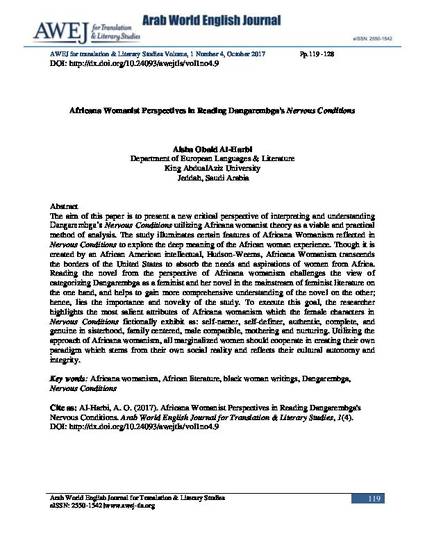
Article
Africana Womanist Perspectives in Reading Dangarembga's Nervous Conditions
AWEJ for translation & Literary Studies
(2017)
Abstract
The aim of this paper is to present a new critical perspective of interpreting and understanding Dangarembga’s Nervous Conditions utilizing Africana womanist theory as a viable and practical method of analysis. The study illuminates certain features of Africana Womanism reflected in Nervous Conditions to explore the deep meaning of the African woman experience. Though it is created by an African American intellectual, Hudson-Weems, Africana Womanism transcends the borders of the United States to absorb the needs and aspirations of women from Africa. Reading the novel from the perspective of Africana womanism challenges the view of categorizing Dangarembga as a feminist and her novel in the mainstream of feminist literature on the one hand, and helps to gain more comprehensive understanding of the novel on the other; hence, lies the importance and novelty of the study. To execute this goal, the researcher highlights the most salient attributes of Africana womanism which the female characters in Nervous Conditions fictionally exhibit as: self-namer, self-definer, authentic, complete, and genuine in sisterhood, family centered, male compatible, mothering and nurturing. Utilizing the approach of Africana womanism, all marginalized women should cooperate in creating their own paradigm which stems from their own social reality and reflects their cultural autonomy and integrity.
Keywords
- Africana womanism,
- African literature,
- black woman writings,
- Dangarembga,
- Nervous Conditions
Disciplines
Publication Date
Fall October 15, 2017
DOI
http://dx.doi.org/10.24093/awejtls/vol1no4.9
Citation Information
Aisha Obaid Al-Harbi. "Africana Womanist Perspectives in Reading Dangarembga's Nervous Conditions" AWEJ for translation & Literary Studies Vol. 1 Iss. 4 (2017) p. 119 - 128 ISSN: 2550-1542 Available at: http://works.bepress.com/awejfortranslation-literarystudies/45/